#Combatting Racism with Education
Explore tagged Tumblr posts
Text
Let's discuss the phenomenon of why "the grass is greener on the other side" as we dive into the beauty of a diverse world that others witness through conversation and education on this sensational Monday:
youtube
#T.Hawk#Zangief#Dee Jay#Ryu#Ken#Dan Hibiki#Lao Tzu#Daryl Davis#The Simpsons#Fred Grimes#Mr. Burns#Team Fortress 2 Highlander#Project +#The Grass Is Greener on the Other Side#Combatting Ignorance with Education#The Beauty of Diversity#Yugioh#Combatting Racism with Education#I Love Mondays#the eagle's perch#Youtube
0 notes
Text
The GOP wonders why young people (and others) don't want to vote for them. Some wise scribe assembled this list.
1.) Your Reagan-era “trickle-down economics” strategy of tax breaks for billionaires that you continue to employ to this day has widened the gap between rich and poor so much that most of them will never be able to own a home, much less earn a living wage.
2.) You refuse to increase the federal minimum wage, which is still $7.25 an hour (since 2009). Even if it had just kept up with inflation, it would be $27 now. You’re forcing people of all ages but especially young people to work multiple jobs just to afford basic necessities.
3.) You fundamentally oppose and want to kill democracy; have done everything in your power to restrict access to the ballot box, particularly in areas with demographics that tend to vote Democratic (like young people and POC). You staged a fucking coup the last time you lost.
4.) You have abused your disproportionate senate control over the last three decades to pack the courts with religious extremists and idealogues, including SCOTUS—which has rolled back rights for women in ways that do nothing but kill more women and children and expand poverty.
5.) You refuse to enact common sense gun control laws to curb mass shootings like universal background checks and banning assault weapons; subjecting their entire generation to school shootings and drills that are traumatizing in and of themselves. You are owned by the NRA.
6.) You are unequivocally against combatting climate change to the extent that it’s as if you’ve made it your personal mission to ensure they inherit a planet that is beyond the point of no return in terms of remaining habitable for the human race beyond the next few generations.
7.) You oppose all programs that provide assistance to those who need it most. Your governors refused to expand Medicaid even during A PANDEMIC. You are against free school lunches, despite it being the only meal that millions of children can count on to actually receive each day
8.) You are banning books, defunding libraries, barring subject matter, and whitewashing history even more in a fascistic attempt to keep them ignorant of the systemic racism that this nation was literally founded upon and continues to this day in every action your party takes.
9.) You oppose universal healthcare and are still trying to repeal the ACA and rip healthcare from tens of millions of Americans and replace it with nothing. You are against lowering the cost of insulin and prescription drugs that millions need simply to LIVE/FUNCTION in society.
10.) You embrace white nationalists, Neo-Nazis, and other groups that are defined by their intractable racism, xenophobia, bigotry, and intolerance. You conspired with these groups on January 6th to try to overthrow the U.S. government via domestic terrorism that KILLED PEOPLE.
11.) You oppose every bill aimed at making life better for our nation’s youth; from education to extracurricular and financial/nutritional assistance programs. You say you want to “protect the children” while you elect/nominate pedophiles and attack trans youth and drag queens.
12.) You pretend to be offended by “anti-semitism” while literally supporting, electing, and speaking at events organized by Nazis. You pretend to hate “cancel culture” despite the fact that you invented it and it’s basically all you do.
13.) Every word you utter is a lie. You are the party of treason, hypocrisy, crime, and authoritarianism. You want to entrench rule by your aging minority because you know that you have nothing to offer young voters and they will never support you for all these reasons and more.
14.) You’re so hostile to even the notion of helping us overcome the mountain of debt that millions of us are forced to take on just to pay for our post K-12 education that you are suing to try to prevent a small fraction of us from getting even $10,000 in loan forgiveness.
15.) You opened the floodgates of money into politics via Citizens United; allowing our entire system of government to become a cesspool of corruption, crime, and greed. You are supposed to represent the American people whose taxes pay your salary but instead cater to rich donors.
16.) You respond to elected representatives standing in solidarity with their constituents to protest the ONGOING SLAUGHTER of children in schools via shootings by EXPELLING THEM FROM OFFICE & respond to your lack of popularity among young people by trying to raise the voting age.
17.) You impeach Democratic presidents over lying about a BJ but refuse to impeach (then vote twice to acquit) a guy whose entire “administration” was an international crime syndicate being run out of the WH who incited an insurrection to have you killed.
18.) You steal Supreme Court seats from democrats to prevent the only black POTUS we’ve ever had from appointing one and invent fake precedents that you later ignore all to take fundamental rights from Americans; and even your “legitimate” appointments consist of people like THIS (sub-thread refuting CJ Roberts criticisms of people attacking SCOTUS' legitimacy).
19.) You support mass incarceration even for innocuous offenses or execution by cop for POC while doing nothing but protect rich white criminals who engage in such things as tax fraud, money laundering, sex trafficking, rape/sexual assault, falsifying business records, etc.
20.) You are the reason we can’t pass:—Universal background checks—An assault weapons ban—The ‘For the People/Freedom to vote’ Act or John Lewis Voting Rights Act—The ERA & Equality Act—The Climate Action Now Act—The (Stopping) Violence Against Women Act—SCOTUS expansion.
21.) You do not seek office to govern, represent, or serve the American people. You seek power solely for its own sake so you can impose your narrow-minded puritanical will on others at the expense of their most fundamental rights and freedoms like voting and bodily autonomy.
22.) Ok, last one. You are trying to eliminate social security and Medicare that tens of millions of our parents rely on and paid into their entire lives. And you did everything to maximize preventable deaths from COVID leaving millions of us in mourning.
Source: https://imgur.com/gallery/e8DBZLH
14K notes
·
View notes
Text
Not Flirting

This is NOT FLIRTING.
The very fact that the media say "flirting" is indicative of the fact that the cultural ideas we have around value, improvement, morality, ability and functionality are *rooted* in a a framework which is ableist and eugenic in nature.
Fundamentally, the idea that there are "good genes" and "bad genes" is saying there are "good" forms of embodymindedness and "bad" forms, and that we should remove or reduce the bad and increase the good.
This is biopolitics which is at the root of 19th, 20th and 21st century processes and horrors, and is not *just* racist, but is one of the major ORIGINS of racism as it manifests today, as well as a wellspring of sexism, homophobia, transphobia, antisemitism, colonialism and capitalism.
We are enmeshed in the world eugenics and its proponents thought up, and wrought. It is so prevalent beneath the surface of how we relate to the world in terms of growth, progress, science etc, that we are like fish swimming in it.
This IS NOT JUST TRUMP. This is the ongoing pandemic, the manfacture of debility in marginalised populations for the benefit of those at the levers of power. This is the dismissal of Appalachian lives and folks in rural areas as low-intelligence inbred hicks who "should have known"/"should have moved" in the face of hurricanes. This the way standardised testing structures education on pass fail and grade curves. On and on, with countless more manifestations and iterations.
**We live in a eugenicised society.**
One that frames who should be improved, and how, on the basis of trajectories which begin by evalulating a being on how much it conforms to a certain set of criteria. We never ask where those criteria come from. We never consider that the liberal humanist agenda might also create folks who *don't fit*, in order to mark those who do.
We should. We should ask ourselves where "the human" even comes from.
[ID :A screenshot from The Guardian's liveblog coverage of the US Election, which reads: "Flirting with eugenics, Trump says: ‘We got a lot of bad genes in our country right now’ In an interview earlier today with conservative broadcaster Hugh Hewitt, Donald Trump used terminology associated with eugenics to attack migrants. The remark came as the former president discussed the alleged harm done by new arrivals to the United States, saying many were “murderers”. “Now, a murderer, it’s in their genes,” Trump continued. “And we got a lot of bad genes in our country right now.” It was language similar to the beliefs of eugenics, which emerged in the late 19th century and held that human ills could be combatted through selective breeding. The theory is today regarded as both inaccurate and racist."]
148 notes
·
View notes
Text

Effie Lee Morris stands as a towering figure in the realm of children's literature and library services, leaving an indelible mark through her visionary leadership and tireless advocacy. Born into an era marked by racial segregation and systemic barriers, Morris defied the odds, rising to become a beacon of change and progress. Her journey began as a public librarian in Cleveland and later in the Bronx, where she cultivated a deep appreciation for the transformative power of literature and education.
In 1971, Effie Lee Morris shattered barriers as the first African-American president of the Public Library Association, a milestone that underscored her commitment to equity and inclusion in library spaces. Her groundbreaking work extended beyond administrative roles; Morris played a pivotal role in shaping the landscape of children's literature by spearheading the establishment of the Coretta Scott King Award. By crafting the original selection criteria in 1970, she laid the foundation for recognizing and celebrating African-American authors and illustrators, ensuring their voices resonated prominently in the literary world.
Morris's impact reverberated within the walls of the San Francisco Public Library (SFPL), where she assumed the role of the first coordinator of children's services. During her tenure, she revolutionized children's literature by establishing a research collection of out-of-print books, meticulously documenting the evolving portrayals of ethnic and culturally diverse groups. This collection, later renamed the Effie Lee Morris Historical and Research Collection in her honor, served as a testament to her unwavering dedication to preserving diverse narratives and fostering cultural understanding.
Beyond her professional achievements, Morris's advocacy extended into the realm of social justice and community engagement. She founded the San Francisco chapter of the Women's National Book Association and actively participated in the American Library Association's Social Responsibilities Round Table, championing causes aimed at combating racism, inequality, and poverty. Her contributions were met with widespread recognition, as evidenced by numerous accolades, including the Silver Spur Award and the Grolier Foundation Award, affirming her status as a trailblazer in the literary landscape.
Effie Lee Morris's legacy transcends generations, inspiring future leaders and storytellers to uphold the values of diversity, inclusion, and equity in children's literature and library services. Her visionary spirit lives on in the countless lives touched by her work, serving as a timeless reminder of the transformative power of literature in bridging cultures, fostering empathy, and igniting change.
Read more about Effie Lee Morris here.
239 notes
·
View notes
Note
Hello Dear, I hope you get my message while you're fine.🙏
I'm Ola, a graduate student from the faculty of science at Al-Azhar university Gaza, Palestine. I'm a dedicated and passionate student, striving to become a good researcher and teacher.
Unexpectedly, After October 7th, my life took a drastic turn with the commencement of the cruel war on Gaza, transforming me from a passionate student to a person struggling for survival. 🥺
I have created a campaign to help my family rebuild their lives and get the basic needs of food, drink, etc in these cruel conditions. And also it will help me to complete my education.
All of what I am asking of you is a reblog of the pinned post on my page and to donate if you can🙏🥺.
I sincerely wish if you can empathize with my dire situation and consider supporting us. Please be certain that any help gets us closer to our goal and no matter how small your donation might be, it will make a significant difference in my family's lives.
I would be very grateful if you could follow me to stay updated, as I will always need your help.💔
My compaign vetted by @90-ghost and @northgazaupdates and @el-shab-Hussien and @nabulsi's vetted list, line 205.
https://docs.google.com/spreadsheets/u/0/d/1yYkNp5U3ANwILl2MknJi9G7ArY4uVTEEQ1CVfzR8Ioo/htmlview#gid=0
Thanks in advance for your kindness and support. I am waiting for your response ❤️
This is my GFM link:
https://www.gofundme.com/f/empower-olas-pursuit-of-education-amid-crisis?qid=30ec4c502382b9962b96d698a687d9a8
Please donate and/or share with others 🥺🙏🇵🇸
Sincerely,
Ola
ola’s campaign is nearly halfway complete!



in light of the anti-arab racism from popular bloggers such as @badjokesbyjeff that literally goes back years, please consider donating to ola and her loved ones.
in her campaign, ola mentions her academic excellence and the bright future that she carved out for herself through apartheid. while nobody is deserving of having to live through such circumstances, one can recognizes that her academic efforts and achievements are extraordinary (and certainly better than anything i and much of this site’s population have have achieved). now, she’s taken the initiative to secure basic essentials for her family in northern gaza.
if the reality of the deep roots of racism within tumblr’s staff and userbase upsets you, taking the time to share + donate to gazans is the best way to combat that. the world will not heal until we all treat each other like family
#winsome’s wailings#free palestine#gaza donation#gaza direct aid#keep donating#palestinian donations#palestinian gofundme#badjokesbyjeff#writingprompts#writing_prompt_s
107 notes
·
View notes
Text
Muppet Fact #1015
Loretta Long, actor of Susan Robinson on Sesame Street, wrote her doctoral dissertation on Sesame Street and its role in combating educational racism.
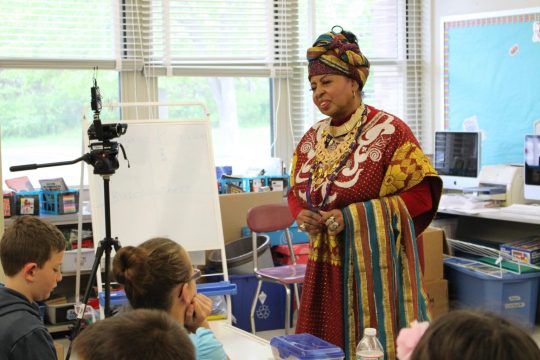
Source:
Loretta Long. "Sesame Street: A Space Age Approach to Education for Space Age Children." Graduate School of the University of Massachusetts. August 1973.
#muppet facts oc#jim henson#the muppets#muppets#muppet facts#fun facts#sesame street#loretta long#susan robinson
166 notes
·
View notes
Note
I am not Palestinian nor am I Jewish. Be that as it may, I hate settler colonialism, even more so as a brown, bi, genderqueer ‘Afab’ person. I just wanted to say. 1) your post on the topic is more empathetic and insightful than I’ve seen a lot of people be about this over my entire life and I’ve asked questions of both sides, I tend to stay out of the fray cause I don’t feel it my place to speak over Palestinians and Jews (who are critical of Israel). But, do you have any advice for being a better ally to Palestinians and combating anti-semitism and anti Jewish racism in the everyday?
hey sweetheart! thank you for your commitment to the movement and your earnestness. i am not Palestinian or Jewish either, so i did what is always considered best: i asked those who are! that's exactly why our Advocacy Committee within BFP exists :)
from one of our Palestinian youth volunteers:
if you have the money to do so, donate to the cause! the unfortunate truth is that to gain access to various resources, things cost money. more specifically, donate to humanitarian aid funds you've done the research for and are sure are doing work on the ground. even better if you can donate directly to those being affected! this includes Palestinians on the ground but also within the diaspora who need self care items, especially for all the work they've been doing educating others. for example, this is an organization this member volunteers with and trusts:
and these are two amazon lists of Palestinian youth within the diaspora:
share posts by Palestinians! the big thing is really just getting the word out, sharing their perspective. Zionist propaganda is hard to penetrate so the least we can do is uplift their voices by sharing!
from one of our Jewish youth volunteers:
understand that not all Jewish people are Zionists and not all Zionists are Jewish. saying the two are equivalent is not only antisemitic but ignores the blatant statistics, like the growing number of anti-Zionist Jewish young adults in the united states for example, or the fact that the biggest supporters of israel are actually evangelicals.
to that same point, know that israel has been purposefully trying to conflate the two in order to then label anyone who does critique the state as automatically antisemitic. it is a tool.
additionally, be careful with the rhetoric you choose to spread & subscribe to (i.e., watch how they describe israel. do they refer to the people as Jews or Zionists? it can tell you a lot about how educated they are and their vague stance on the matter)
my own additions as a longstanding ally and friend of those involved:
learn your history! there is a clear attempt to distort the history of Palestine. learn what Palestine was like before israel's occupation. learn about the way pioneering Zionists openly called Zionism "colonialism" and didn't even try to hide it. learn about how discussions of the Zionist project were discussed roughly 80 years before the Holocaust ever happened. this does not mean that some Jews did not, in fact, move to Palestine in response to such a horrific event, but in the words of a Jewish mutual of mine, israel's rhetoric literally weaponizes Jewish trauma by conflating these two dates in history.
BDS movement! stands for boycott, divestment, and sanctions!
when possible, actually speak to people of Palestinian descent. like seriously. posts are great, but actually speaking to people who are knowledgeable in real time can be so helpful for getting your questions addressed, so long as you are respectful, of course. a great place to do this, not even to advertise, is actually our Discord server linked in our bio @bfpnola
know that language matters, as inconsequential as it may seem. in the words of my Palestinian, Kashmiri, and Artsakhi friends and/or mutuals, when speaking of occupations, we capitalize the occupied people's country (ex. Palestine) while not doing so for the occupier's (ex. israel) to delegitimize them.
learn about Hamas and its history/purpose. here are my notes on two podcast episodes let by Palestinians:
thank you for your ask! im sure i may think of other things later but these are my answers for now.
-- reaux (she/they)
#reaux answers#free palestine#palestine#israel#gaza#allyship#mutual aid#antisemitism#jewish#anti zionism#resources#donations#donate
147 notes
·
View notes
Text
Rural Communities, Illyria, Yt Liberalism/Leftism + Classism
I'm having a hard time putting into words how I feel performative activism and political pandering plays into the way the IC works with Illyria
like
ok so I'm from rural Iowa. I am from a community of people who are prideful and hate handouts. we'd rather break our backs working ourselves into the ground instead of asking for help
now, I am looking at these Illyrians. these close-knit peoples who are prideful and work themselves ragged. As someone from a poor family, in a poor, prideful, relatively 'conservative' area, I can see a lot of similarities between Ilyria and my home. Not so much the rampant wing clipping and violent misogyny, but the pride and stubbornness that gets in our own way (note: misogyny, racism, ableism, etc etc etc are often the results of settler colonialism + yt supremacy. they just don't come out of NOwhere and were/are used as a tool to keep yt rich folks in places of power by causing class divide)
enter Cassian and the IC, people who greatly dislike the Illyrians, who routinely look down on them and call them backwards, uneducated, etc (note: this stereotypical language is due to racist undertones, canonically. This is just from my own perspective as someone from a low class rural area)
Cassian, who somehow has a victim complex due to the systemic problems of Illyria, but also does not actively push for Real Systemic Change outside of making the women Also be warriors, comes into the camps, he brings blankets, small tokens to help aid them and personally, if I saw someone from my home town who had made it very clear of how he actually feels about us try to give us blankets? I would not take a damn thing from him bec which is it? are we just the absolute Worst People Ever or do you feel *sorry* for us. And even if that is not his intention, which I don't think it is at all, he has proven time and again he's "better" than them
Cassian more-or-less scorned the Illyrians, as did Rhys and Azriel, and the more Cassian keeps aligning with Rhys compared to finding solidarity and alliances and progressivism with the Illyrians, the more alienated and isolated he's going to make himself from them
Cassian aligning himself with Rhys and the IC and Velaris and the High Lord's family removed him from the class and community solidarity if his own community. He profits off of the systemic problems that are in place despite having been a victim of the same problems
a lot of the ICs performative actions and pandering towards the Illyrians, just enough to get what they want out of them (bodies for a war), and their inability to push for actual, progressive and real change quite honestly reminds me a lot of the yt liberal and democratic politicians who look down on rural folks and have called us backwards and uneducated and hicks.
The IC hide their own prejudices and bigotry behind a shield of contempt and the systemic problems of the Illyrians, the same way I see from a lot of leftist + yt liberals here in the cities
The Illyrians have very real problematic systemic issues that need addressed and actively changed. And it's very interesting, for me, that the wing clipping and violence towards Illyrian women are so highlighted when violent misogyny seems to be fairly normal/common among the fae, in general, according to SJM, anyways
The way you combat systemic issues is through education, social programs and funding, policy changing, etc
what, exactly, is the IC doing for the people of Illyria outside of small performative gestures and "change takes time"
I see the same social problems of "change takes time" with democratic policies and I look at rural areas, and the Illyrians, who need help NOW. they're people getting routinely abandoned or forgotten unless we're needed for something bec they're "backwards" and "uneducated" and "hicks"
I'm not sure if I'm wording this well, tbh, but it feels very... familiar to what I have experienced living in rural Iowa for most of my life compared with the last few years here in the city
tagging: @bookishfeylin @kateprincessofbluewhales @acotardeservesbetter @ae-neon @andramoreaux
95 notes
·
View notes
Text
𝐓𝐇𝐄 𝐏𝐑𝐎𝐁𝐋𝐄𝐌 𝐖𝐈𝐓𝐇 𝐃𝐈𝐒𝐓𝐑𝐈𝐂𝐓 𝟏𝟏; 𝐈𝐍𝐂𝐎𝐑𝐑𝐄𝐂𝐓 𝐏𝐎𝐑𝐓𝐑𝐀𝐘𝐀𝐋 𝐎𝐅 𝐀 𝐌𝐈𝐍𝐎𝐑𝐈𝐓𝐘
hi! this post has been on my mind for a very long time, and with a possible hunger games resurgence underway, i want to address the not-so savoury and digestable bits about collin's writing, including her characterizations of black individuals within the trilogy.
first of all; district 11 is described as a large district, with its population mainly being black, or at least people of color. this is shown in the movie adaptations, and the several characters we meet throughout the series.

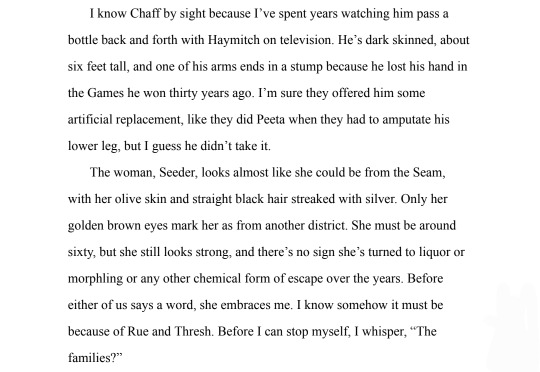
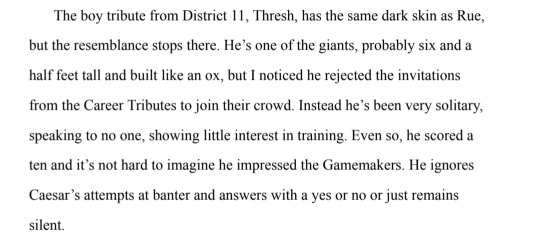
(rue, chaff and seeder's descriptions, but thresh, too.)
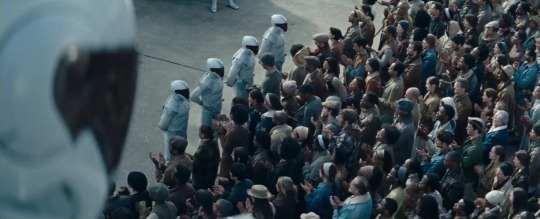
(depiction of district 11's population in the movie adaptation of catching fire.)
𝐬𝐨, 𝐰𝐡𝐚𝐭'𝐬 𝐭𝐡𝐞 𝐩𝐫𝐨𝐛𝐥𝐞𝐦?
genuinely? the characterization of these individuals, such as chaff and thresh (both black males specifically.) the portrayal of both characters being a threat in size and combat, which is also often a microaggressive stereotype tied to black men.

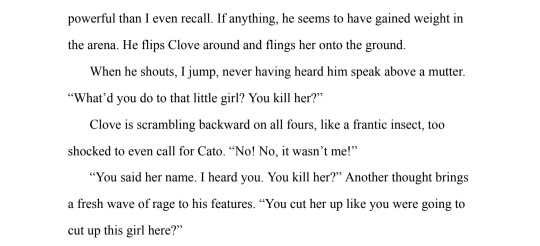
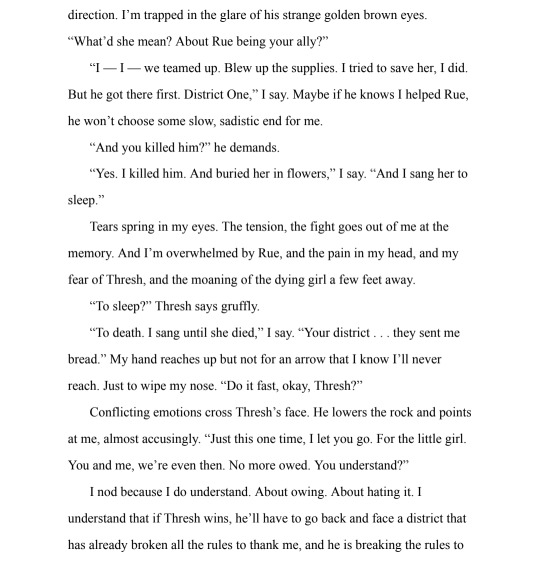
(effie's reaction to the 75th's reaping & her snide comment against chaff, catching fire + thresh killing clove/sparing katniss, the hunger games.)
of course, i won't downplay thresh's kindness in his sacrifice of sparing katniss, but the display of his brutality paired with his decent & race does not look good (considering that the hunger games is written by a white woman!) and to me, will always come across as uncomfortable. even his speech makes him seem uneducated, more brawn than any brain, and that's also a heavy misconception when it comes to black men/boys/etc. i can see where suzanne tried to balance it out, but it doesn't work well in the slightest.
furthermore, we have to talk about the state of district 11 as a whole.
agriculture/farming as the role for one of the largest districts if not THE largest, seems innocent by itself. but then you have the treatment of its citizens, the way the population is worked, and the overall uneasiness of it.
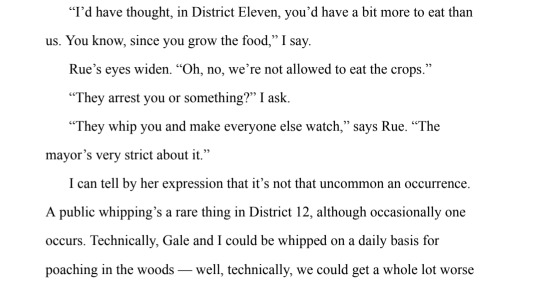

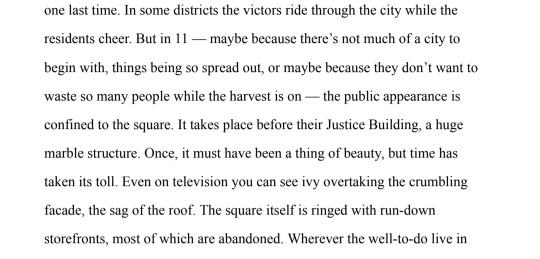
(rue's experience in 11, the hunger games + katniss’ description of the district, catching fire.)
public whippings, senseless cruelty towards again, a WIDELY black populated district and their continual work on fields/in harvests all speak to remnants of slavery and pastimes taken place within the era of slavery. if suzanne collins was trying to make a point, or mock the treatment of this minority through a portrayal in her book as a white woman, she missed the mark POORLY. having the BLACK citizens, including women, children and men all working out in the fields? disgusting. beyond incomprehensible.
hoarding a minority in one district is crazy work too, because we barely hear about any other black characters minus paylor, beetee, and potentially cinna. and the fact that in katniss' eyes, 11 is treated perhaps the worst? says a lot.
𝐰𝐡𝐲 𝐦𝐚𝐤𝐞 𝐚 𝐩𝐨𝐬𝐭 𝐚𝐛𝐨𝐮𝐭 𝐢𝐭?
truthfully, i'm bringing awareness to my discomfort as a black teen/general black individual because this isn't just something you should brush past. you should see the treatment of these characters and condemn it. i see next to no posts about the blatant racism towards black people/poc in the hunger games and also within the fandom. this has been swept under the rug over and over and blatantly, I'm tired.
collins perpetuates the suffering of district 11 in historical and supposedly educational ways, but that doesn't make it okay for her to do so. as a white woman, collins abuses the usage of racial stereotypes with examples of district 11 men, the culture, their work, but also a wider environment than just 11, such as district 12 too (with the perpetuation of gale.)
#before you tell me “this is a stretch!” PLEASE read the post. literally read and research if anything#because this isn't something to be argued about#you should listen and hear black voices and understand where I'm coming from with this#because having thg as my special interest means a lot to me#but i will not ignore it's problematic bits for the sake of keeping peace and tranquility within a pretty ignorant fandom#the hunger games#the hunger games trilogy#thg#catching fire#mockingjay#rue barnette#rue thg#seeder thg#chaff thg#thresh thg#please don't argue with me in reblogs/tags/comments either. especially if you're non poc because i simply do not care#and please treat this post with the respect and kindness it deserves. i see my non-serious posts get from 20-50+ likes at least#so prioritize this just as much as you would any other post of mine
37 notes
·
View notes
Text
social dynamics of HAIQIN
------------------------------------------------------------------------------
date: november 11, 2024
------------------------------------------------------------------------------
The Social Dynamics of Haiqin
Class System
Haiqin’s class system is complex, allowing for social mobility but still deeply influenced by wealth, education, and historical family status.
Hierarchy and Social Mobility:
The system is influenced by meritocracy, meaning individuals have the potential to move up in social standing through personal achievement, education, and contributions to society. The wealthy elite, including aristocratic families and affluent merchants, maintain their positions primarily through inherited wealth and long standing societal roles. However, individuals from lower socioeconomic backgrounds can ascend by excelling in areas like entrepreneurship, education, or through significant societal contributions, such as breakthroughs in science, technology, or social welfare.
Class Treatment:
The wealthier class has better access to resources such as advanced healthcare, elite educational institutions, and luxury goods, which further consolidate their wealth and social status. This creates an often rigid division between them and the poorer segments of society. In contrast, poorer citizens, especially those in rural or underdeveloped areas, face greater barriers in terms of access to basic services and opportunities. However, the government’s policies on universal education, healthcare, and anti-poverty measures attempt to level the playing field and provide avenues for upward mobility.
Urban vs. Rural:
While Haiqin's larger urban centers provide ample opportunity, rural areas remain underdeveloped, with limited access to technology and education. The government’s attempts to bridge this gap by promoting rural education, infrastructure development, and encouraging migration to cities for better opportunities have led to more equal opportunities for some. However, these measures often fall short due to regional disparities in governance, leading to challenges in truly achieving equality.
Obviously, I scripted out poverty. but this is more so for lore I guess lol. I also scripted out homophobia, racism, etc. I feel like that's a given anyway.
Race & Ethnicity
Haiqin is known for its rich ethnic diversity, the result of centuries of migration, cultural exchange, and intermarriage. This diversity is embraced and celebrated, with public events and national holidays acknowledging the various cultures within the country.
Ethnic Composition and Integration:
The primary ethnic group in Haiqin is the Haiqinese, but the country also boasts a variety of ethnic minorities that have contributed to the fabric of society. The government fosters a multicultural identity, celebrating diversity through cultural festivals, language preservation programs, and community outreach. Intermarriage between different ethnic groups is common, contributing to a blending of cultures. While tensions between some ethnic groups can arise in specific areas, these are often mitigated through government policies aimed at promoting inclusivity.
Government Initiatives:
The government plays an active role in combating ethnic discrimination, ensuring that policies are inclusive and that minority groups are represented in key societal positions. Policies are also designed to provide equal access to resources like healthcare and education, attempting to reduce the historical inequalities faced by minority groups.
Ethnic Celebrations and Cultural Events:
Cultural and religious diversity is celebrated through national holidays, parades, and exhibitions, fostering a sense of shared identity. Different communities, from the Haiqinese to minority groups, have their own festivals and holidays that are recognized and celebrated throughout the year, contributing to a vibrant, inclusive society.
Gender Roles
Haiqin is progressive when it comes to gender roles, promoting equality and inclusivity across all sectors of society. Gender equality is seen as an integral part of the nation’s modern identity.
Gender Equality in Work and Politics:
Men and women have the same opportunities to pursue careers in traditionally male-dominated fields such as the military, government, and business. While certain jobs may historically have had gender-specific roles (e.g., women in caregiving roles and men in physical labor), these lines are increasingly blurred as social norms evolve. Non-binary individuals are recognized and often hold visible positions in public life, especially in artistic, political, and social spheres.
Cultural Gender Norms:
Despite official equality, cultural and familial expectations still influence gender roles in specific areas. For instance, women may face pressure to marry and start families at certain ages, though this is becoming less prominent with the rise of women’s autonomy in the workplace and education. Similarly, while men are encouraged to pursue leadership roles, the expectations placed on them can sometimes limit their ability to express vulnerability or emotional needs.
Rituals and Celebrations:
Gender-specific rituals are still practiced, particularly in rural or traditional communities. These often celebrate the milestones of different genders (e.g., coming-of-age ceremonies), but with an increasing focus on inclusivity, many rituals now honor multiple gender identities. Cultural festivals, such as the Day of Freedom, often highlight the contributions of different genders to society, reflecting a growing recognition of gender diversity in all public spheres.
Sexuality
The approach to sexuality in Haiqin is becoming increasingly open, progressive, and inclusive, with the government and society at large supporting LGBTQ+ rights and visibility.
General Attitudes:
Attitudes toward sexuality have evolved significantly over the last few decades. The majority of the population now supports LGBTQ+ rights, with public awareness campaigns, education programs, and legal reforms advocating for equality. There is widespread acceptance of LGBTQ+ relationships, especially in urban areas where young people are more likely to be open-minded. This shift is partly driven by the younger generations, who are more willing to challenge traditional norms and fight for social justice.
LGBTQ+ Representation and Rights:
In recent years, the visibility of LGBTQ+ individuals in media, politics, and the arts has increased. Pride parades and other LGBTQ+ celebrations are becoming a regular part of the cultural calendar. Laws have been passed to protect LGBTQ+ individuals from discrimination in the workplace, in education, and in healthcare. Adoption rights for same-sex couples have also been extended in several parts of the country, further advancing the acceptance of diverse sexual orientations.
Cultural Representation:
LGBTQ+ relationships are increasingly depicted in the nation’s literature, film, and art. Cultural productions reflect the evolving social attitudes towards sexuality, and LGBTQ+ artists and writers are more likely to be celebrated for their work. This representation has helped further normalize diverse sexual identities, contributing to broader societal acceptance.
Societal Issues and Advocacy
While Haiqin is progressive, societal challenges remain. Advocacy groups for various causes—such as gender equality, racial justice, and LGBTQ+ rights—continue to push for reforms to ensure that all citizens, regardless of their identity, have equal opportunities and rights. These organizations are vital in shaping public discourse and raising awareness of ongoing issues, such as:
Economic Disparities:
Despite efforts to provide equitable access to resources, the gap between the rich and poor remains significant. Advocacy for economic justice continues to address issues like poverty, access to education, and healthcare.
Again, scripted out poverty. But then again, there will still be a difference between middle class and the wealthy, just everyone won't have to worry about money, or the risk of being poor, etc
Environmental Justice:
With Haiqin’s commitment to sustainability, environmental groups advocate for more stringent laws to combat pollution, protect wildlife, and ensure responsible resource management. As the nation modernizes, there is a constant balancing act between industrial development and environmental preservation.
Mental Health Awareness:
Mental health is gaining traction in Haiqin, with more public discussions about the importance of mental well-being and the need for accessible mental health services. Traditional stigma is being challenged, but advocacy for mental health care is still developing.
#reality shifter#reality shifting#shiftblr#shifting community#shifting#shifting motivation#shifting reality#dr scrapbook#dr world#reyaint#anti shifters dni
10 notes
·
View notes
Text
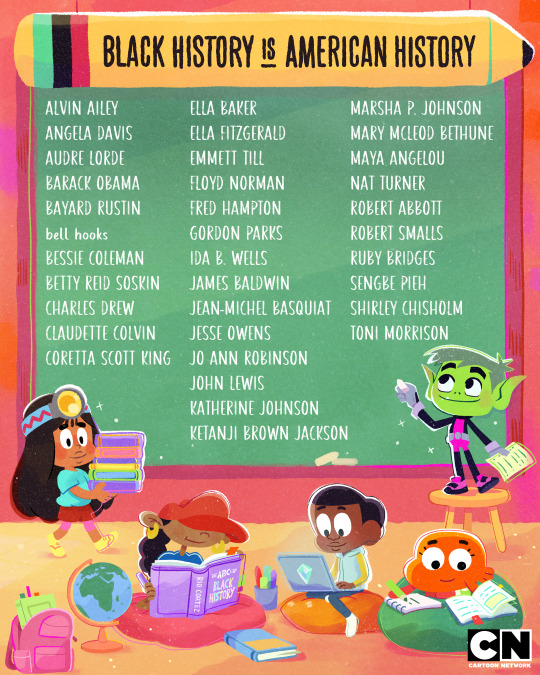
Black History IS American History ✊🏿✊🏽✊🏼✊🏾💖 As we learn and reflect together, we can better understand and find ways to combat racism and prejudice 👐🏾🌎 We believe that history should be taught accurately, and in its entirety. Black Americans have been instrumental in shaping history, art, culture, technology, and activism in America and around the world. We take this moment to recognize and honor the contributions by these influential figures and so many more. In partnership with The Conscious Kid, we have provided some resources to help everyone learn more about Black History
The Conscious Kid cartn.co/ConsciousKid
Black History in Two Minutes cartn.co/BlackHistoryInTwoMin
The HistoryMakers cartn.co/HistoryMakers
Smithsonian National Museum of African American History and Culture cartn.co/NationalMuseum
Common Sense Media cartn.co/CommonSenseEdu
Center for Racial Justice in Education cartn.co/CenterRacialJustice
#CartoonNetwork#blackhistorymonth#bhm#BlackHistoryMonth2023#BlackHistory#BlackCulture#TheConsciousKid#blackhistoryisamericanhistory#blackhistorymonth365#equality#diversity#blackcreatives#blackart#blackexcellence
227 notes
·
View notes
Text
Deconstructing the pseudoscientific foundations of racist ideologies like scientific racism is such an important part of combating them. By examining the deeply flawed and agenda-driven work of figures like Morton, Agassiz, Broca and others, we can expose how racial categories were socially constructed for oppressive purposes, not rooted in real science.
I appreciate you highlighting the value of focusing educational efforts on the individuals who propagated these corrupt theories. It personalizes an understanding of how racial beliefs were sculpted by human biases and motives, not objective truth. Dismantling these archaic ideologies requires comprehensively discrediting their origins and ideological architects.
These are complex but vital conversations to have as part of promoting genuine education that combats racism, colorism and related social ills in their many insidious manifestations. I'm grateful for the opportunity to ponder these issues alongside someone clearly dedicated to furthering racial justice and human equality.

I still engage in critical thinking with my colleagues who themselves are fighting tirelessly to stop the mistreatment of Black Indigenous People globally. This is something that we speak about often and I want to share the brief discussion with you.
12 notes
·
View notes
Text
By ZACH KESSEL
One recent college graduate, alongside her former professor, has created a documentary series aimed at educating people past the flashy signs and catchy slogans one might see and hear at an anti-Israel rally, toward a full understanding of what Zionism and anti-Zionism really mean. That series, “Zionism and Anti-Zionism: The History of Two Opposing Ideas” by Zoé Tara Zeigherman, had its Washington, D.C., premiere Thursday night.
The series, a five-episode look at the varieties of both its titular subjects, covers Jewish history and the development of Zionism, the intra-Jewish debates that occurred before Israel’s founding in 1948, and various strains of anti-Zionism from post-1948 Arab opposition to Israel to Soviet propaganda.
Zeigherman, alongside her former Georgetown University professor (and former member of Israel’s Knesset) Einat Wilf, began formulating the idea for the series in 2022, well before anti-Zionism and antisemitism shot to the fore of public debate following the October 7 Hamas attack. Zeigherman thinks the problem was always there, but now that college campuses are under a microscope, the documentary series is even more relevant.
“I think that what a lot of Jews have experienced since October 7 is kind of waking up to this feeling that something is seriously wrong; seeing protests on October 8, they’ve been feeling that something is mobilizing against Jews, and they don’t really understand what’s happening.” Zeigherman told National Review. “I had that feeling in the Black Lives Matter protest era when antisemitism was erupting online and I couldn’t understand where it was coming from.”
vimeo
“If it can just help one young Jew the way Einat’s course helped me, that’s enough,” she told NR. “But I would really like to see it be part of something bigger, where Jews aren’t afraid to be Jews anymore — where we stand taller and prouder and go on offense as opposed to constantly defending ourselves and apologizing.”
Zeigherman initially came up with the idea for the series during her time as a Beren Summer Fellow with the Tikvah Fund, a nonprofit organization that promotes Jewish leaders and ideas, in 2022. While a fellow, she worked with individuals both inside and outside the Tikvah Fund to determine how to bring her vision to life.
23 notes
·
View notes
Note
The longer BNHA goes on, the more I start to ask this question.
Is this a story worth telling?
It brought up some interesting things to think about like what it really means to be a hero and if villains really are evil or people that society failed.
But then comes the muddled messages, characters that barely do anything significant other than to be plot devices, the overhyping of one character that ruins the purpose and development of the main character, and the inconsistencies and conclusions that characters come to that makes little to no sense.
Then you just have a story that just goes NOWHERE!
Because let's be honest, how much will society actually change by the end of it all? How will it treat quirkless and those with less than stellar quirks? And will they actually allow people like Bakugou to become heroes all because they "try really hard"?
Hi there, @theloganator101 First off, thank you for the question.
Also, TLDR.
Long before, I had made a somewhat similar post, talking about the same points. What makes a hero a hero? Because it's more than wearing a cape and punching issues and problems into submission. Bad guys simply go to jail and rot till their dying breath. And why is the world of BNHA so black and white? So 'this is good and this is bad'? We have a very compartmentalized version of human society. But you and I both know very well that human nature, human social interactions are the most complex and difficult things to understand. And even though I had seen these flaws in the series much earlier, I was still forgiving of the author because I genuinely thought he would eventually come around and explain why things are they way in the BNHA verse. But that NEVER happened at any point in the series so forget about Hori addressing these issues now because BNHA as a whole doesn't matter.
It's a no brainer to say that the job of a 'hero' is to save the day. But what about those who are the victims of school bullying? (cough cough BkDk is a totally normal and a healthy relationship, you're just a homophobe if you dont ship them) or those who had to keep their voice and entire existence heavily suppressed because your marriage was just a means to an end? (Endeavour is a loving husband, a doting father and a hard working hero) What about those kids who are victims of child abuse, child neglect and discrimination? (the Todoroki kids, Shigaraki, Toga and heck, even low key Spinner grew up in loving and healthy households). The Creature Rejection Clan was created to combat racism and All Might, someone who's name itself reduced crime in Japan by a half simply by existing, did NOTHING against the CRC. I thought 'heroes' were meant to protect the weak and deliver justice to the evil doers irrespective of who or what they are. I thought that's what's really meant to be a hero, to be defenders of mankind. Because lets face it, what's the difference between a villain who kills and a hero who abuses his family members on a physical, mental and an emotional level? What are the required criteria to judge these very two damnable actions with a bias attitude?
Which brings me to another question: Why are the students at UA high only taught martial or physical training? Don't they have special classes where they have to moral education classes or something along those line? Besides the rigorous physical training they need to fight against heroes, they have normal, regular-degular academic curriculum. These so called heroes-in-training are well educated in the art of understanding the topography of a battle field but the system has FAILED to educate the kids to understand why villains are the way they are. The entire system, the root itself, the very foundation of the hero society, FAILED to protect what they claimed to be. People like Toga, Dabi, Overhaul, Spinner, Shigaraki, Twice, Stain, Magne, are all nothing but the products of the hero society, the actual end result of this superficial, celebrity-like lifestyle of hero worship. But many fail to see beyond the stars and shimmers of this artificially constructed world.
The above points are heavily tied to Stain's ideologies. He didn't put up arms and struggles against the hero society for nothing. He knew what he was doing.
This may not be the answer that you're looking for but the way I see it, the MHA story shows us a horrifying representation of our already dark and twisted world but that's where it stops. It wants to do nothing with it because the story doesn't know where to go with it and how to go about doing it. It started something it couldn't finish. It created issues it couldn't solve. So the plot choose a different path to tread upon: focus on the popular people from the hero society who are highly questionable and romanticize their words and actions. It doesn't matter if you faced quirk discrimination or worse, became a butt of ridicule for not having any quirk at all. So long as a bully has given a half baked ''apology'' and works hard to be a hero to satisfy their own ego, it's all good at the end of the day. Self worth issues, self inflicted bodily harm, lack of self worth received by the victim (definitely NOT Izu because Bk treats him with utmost respect and comradery), all melt away due to the power of 'apology' and friendship. It teaches us that celebrity worship, fake sense of heroism, the desire to be the top at the expanse of others are to be treated with normalcy because the show must go on no matter what. The other message is that it's ok be a wife beater and a bully so long as you're doing it for heroism, name, fame, recognition.
Our priorities in the MHA universe are all messed up. We don't even have an inkling of a thought about how Izu feels about quirkless discrimination and the manga is wrapping itself up. So all the answers we can provide ourselves with regarding the matter will be head canon.That's why the main message of the story is that it fails on so many levels in terms of writing a morally upright story. The main hero of our story is nothing to offer, no words of hope and encouragement. That's the other message it has conveyed to us. I'm not saying this, the manga has proven to us time and again what i just said. The other thing it hammers home is the fact that, so long as you're a hero, your unjust behavior will be swept under the rug by your school and higher authorities. The message that MHA time and again conveys is that it loves hypocrisy and double standards. These are the solid reasons as to why the plot cannot logically and cohesively march forward.
"With great power comes with great responsibility" and the MHA verse failed to understand this concept by becoming the very thing the villains are condemned for in this series. That, my friend, is the general message of the story. That, my friend, is the moral lesson of the MHA verse.
#MHA critical thinking #bk is a bully #Izu deserved better #Izu is the protagonist not Bk #Izu matters Bk doesnt #Hori cant write shit
20 notes
·
View notes
Text










capital.shutter: There is still a race to win 🌍
-
I’m a Formula 1 fan since 1994. I’m a studied business engineer for environment & sustainability. I’m a German with an African family history. 🙋🏾♂️
So, it is safe to say that meeting @.sebastianvettel at the Festival of Speed this year was undoubtedly my personal highlight. Not only is he with 4x World Championships on his name one of the greatest of all time, he is also an unadulterated, authentic character - which in itself is getting more and more rare in this world. 🖤
Not shying away from stepping in for his own beliefs, Seb is pushing the ecological importance into areas that were barely touched by these topics before, like motor racing, and creates a global awareness of the importance of changing the status quo to combat the ever growing climate crisis with his initiative 'There is still a race to win'. 🌿
At the Festival of Speed, Seb was driving the iconic Williams FW14B. It’s worth to mention that it was running on synthetic fuels - with total carbon neutrality. 💚
But my admiration for him goes way beyond all of that. Why? @.lewishamilton said it best during a recent interview:
"We have to get people to empathize against racism. We need empathy. Sometimes I wonder, doesn't anyone else care?
"Sebastian Vettel was one of those who supported me the most. He told me that some teams spoke racist things about me. He knelt with me in 2020, I have not yet seen a driver as brave as him. 🫶🏾
“You have to change the laws so that people live better. We are risking our lives to try to educate others.”
And now you may understand, why it was a matter close to my heart to take all my courage & thank him personally for everything he has demonstrated & achieved in recent years - the fact that he listened and even cut out a few moments for me, will forever persist to be one of the best moments I’ve ever experienced. 🙇🏾♂️
I’m a Formula 1 fan since 1994. I’m a studied business engineer for environment & sustainability. I’m a German with an African family history. I’m full of admiration for @.sebastianvettel. DANKE SEB! 🙏🏾❤️
74 notes
·
View notes
Text

The Francis Howell School District school board in #Missouri has stirred controversy by voting to eliminate two high school courses, "Black History" and "Black Literature," designed to address discrimination within the district. These courses were introduced in 2021 following reports of discrimination experienced by students and staff. The decision to remove the courses has sparked debate, with some claiming that the curriculums contain elements of #criticalracetheory (#CRT) and are based on the Southern Poverty Law Center's Learning for Justice project, which aims to combat white supremacy and promote human rights. Parents and students protested the removal, arguing that it limits education and infringes on their right to learn about various topics without ridicule. Others supported the board's move, stating that they would only back the courses without a "progressive political agenda." A petition with over 3,000 signatures calls for the reinstatement of the courses, emphasizing their importance in understanding American history and promoting diversity, equity, and inclusion. Earlier this year, the school board also rescinded its "anti-racism" resolution, which had been established in response to #GeorgeFloyd's murder in 2020, citing a lack of evidence that it benefited students. The Southern Poverty Law Center criticized the decision, stating that it harms all students and defended its Learning for Justice standards as a roadmap for anti-bias education. The school district did not immediately respond to requests for comment.


#white supremacy#racism#social justice#equality#end hate#anti-racism#racial equality#stop racism#no to hate#dismantle racism
18 notes
·
View notes